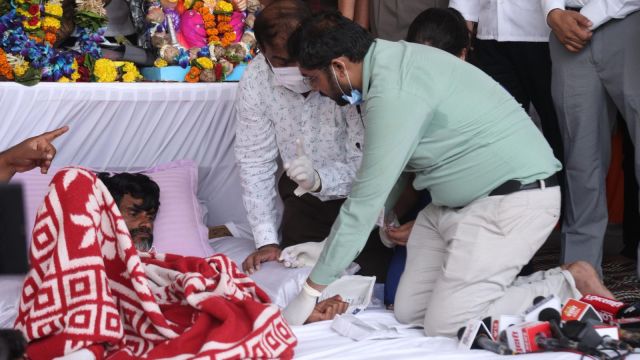Maharashtra assures Kunbi status to eligible Marathas for quota, Jarange ends stir
Govt to implement Hyderabad Gazette, which will help Marathas seek Kunbi status
 This was the government’s first outreach to Manoj Jarange Patil since his latest protest began. (Express photo by Akash Patil)
This was the government’s first outreach to Manoj Jarange Patil since his latest protest began. (Express photo by Akash Patil)Maratha quota activist Manoj Jarange Patil ended his five-day hunger strike at Mumbai’s Azad Maidan on Tuesday evening after the Maharashtra government accepted most of his demands, issuing a Government Resolution (GR) on implementing the Hyderabad Gazetteer to extend Kunbi status to Marathas of Marathwada.
While Jarange Patil has been demanding Kunbi status for all Marathas from Marathwada, to make them eligible for reservation under OBC category, the GR lays down a detailed framework for verification, underlining that applicants would have to show historical evidence of their Kunbi lineage.
The Hyderabad Gazetteer is a document which will help Marathas establish their Kunbi credentials, the government said.
According to the three-page GR, released by the social justice and special assistance department, three-member committees at the village level — comprising the gram revenue officer, gram panchayat secretary and assistant agriculture officer — will scrutinise all applications. Applicants without land ownership documents must submit affidavits proving that they or their ancestors resided in the area before October 13, 1967. The committees will also consider affidavits or testimonies from relatives, clan members, or other villagers who already possess Kunbi certificates.
Based on these inquiries, the authorities will issue Kunbi, Kunbi-Maratha or Maratha-Kunbi caste certificates.
Jarange Patil, who began his hunger strike on August 29, accepted the government’s proposal after a ministerial delegation visited him at the protest site on Tuesday afternoon. Water Resources Minister Radhakrishna Vikhe Patil, who heads the cabinet sub-committee set up on the Maratha quota issue, later presented the draft GR at the site. He was accompanied by Ministers Manikrao Kokate, Shivendra Raje Bhosle and Uday Samant – Vikhe Patil, Kokate and Bhosle are from the Maratha community.
“The sub-committee has decided to approve the demand for the implementation of the Hyderabad Gazetteer. According to the government decision, an action plan is proposed under which those from the Maratha community in villages will be issued Kunbi certificates after verification, if their relatives, clan members, or people from the same village have already been issued such certificates,” Jarange Patil said.
“Six of our eight demands have been accepted… While the Hyderabad Gazetteer will be enforced through this GR, the government has requested a month to take decisions on the Satara, Bombay and Aundh Gazetteers. If there is anything misleading in the GR, we will not allow ministers to roam freely in Maharashtra,” he said. Calling it a temporary victory, he announced that he would return to Jalna with his supporters. He said his movement would continue until all Marathas obtain Kunbi certificates.
Speaking to the media later, Chief Minister Devendra Fadnavis said: “We have maintained that we will not allow injustice to any community. Nor would we allow a situation where Marathas and OBCs are at loggerheads. We have ensured adequate safeguards and given justice to both communities.”
“We also took a position that a decision on Maratha reservation should be within the legal framework. Therefore, we conveyed to Jarange Patil that blanket issuance of Kunbi certificates to all from the Maratha community in Maharashtra was not possible… Reservation is given to individuals based on documentary proof, it is not given to a community,” Fadnavis said. By accepting the Hyderabad Gazetteer, individual Marathas can track their ancestral lineage, which will help them to avail reservation, he said.
Speaking to a news channel, Deputy Chief Minister Eknath Shinde welcomed Jarange Patil’s decision to call off his protest.
The GR starts with details on the region’s historical and administrative trajectory, saying the region was part of Hyderabad State until its merger with India on September 17, 1948, and was later integrated into Maharashtra on May 1, 1960. Under the Nizam administration, Kunbis were recorded as “Kunbi/Kapu” in official documents and Census records of 1921 and 1931, and were primarily engaged in farming, it says.
The GR draws on the work of the Justice (Retd.) Sandeep Shinde Committee, set up in September 2023 to trace Kunbi records across Marathwada. The committee examined documents in Hyderabad’s archival and revenue departments, the Census Office, National Archives in Delhi, and various district offices across the region, identifying over 7,000 previously untraced Kunbi entries. Private family documents were also collected where available. The committee’s tenure has been extended to December 31, 2025, to complete the studies on the Satara, Bombay, and Aundh Gazetteers, ensuring comprehensive implementation.
The GR also references earlier notifications issued on July 18, 2024, which had amended rules under the 2000 Caste Certificate Act to expand admissible documentary evidence. The latest resolution builds on that framework to simplify and expedite the process for Marathwada Marathas, ensuring that even landless farmers, agricultural labourers, and sharecroppers can obtain caste certificates through affidavits and local verification.
With ENS, Mumbai







